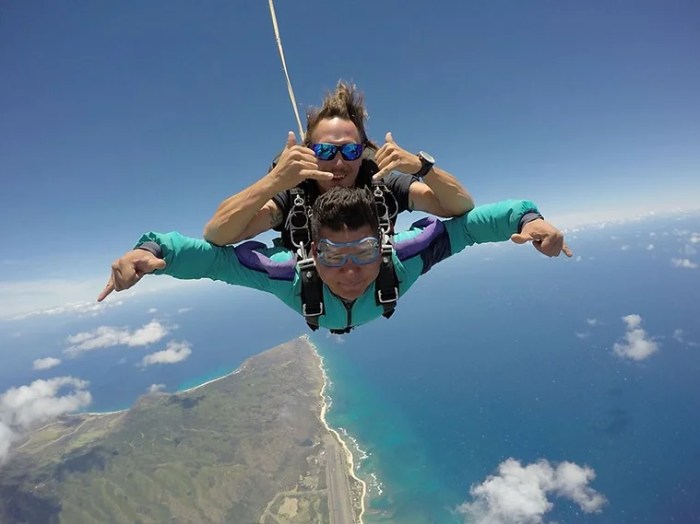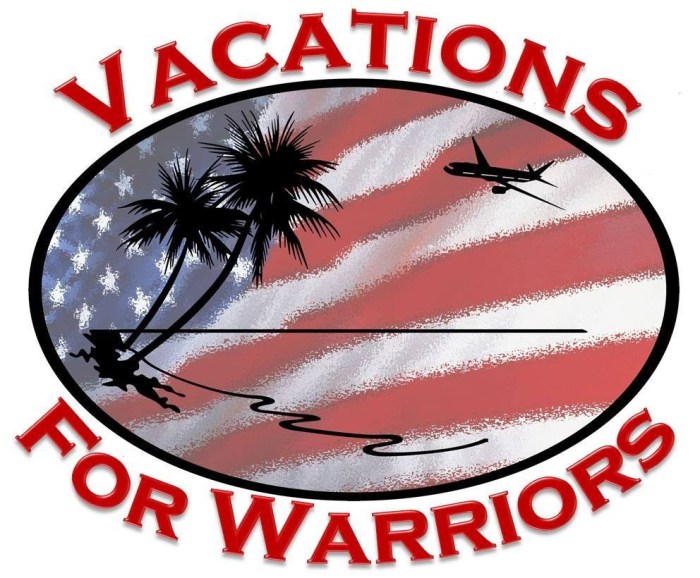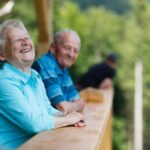Veterans Vacations offer more than just a break; they provide crucial opportunities for rest, recovery, and reconnection. This exploration delves into the diverse types of vacations available, from adrenaline-fueled adventures to tranquil retreats, highlighting resources, accessibility, and the profound impact on veterans’ well-being. Understanding the financial aid options and booking processes is key to ensuring these restorative journeys are accessible to all who have served.
This report examines the various programs and resources designed to support veterans in accessing well-deserved vacations. We will analyze the different types of vacations catered to specific needs, the financial assistance available, and the positive impact these getaways have on physical and mental health. The aim is to provide a comprehensive guide for veterans seeking rest and rejuvenation.
Finding and Booking Veterans Vacations

Securing a well-deserved vacation for veterans requires navigating a landscape of resources and options. Understanding the available avenues and the booking process can significantly simplify the experience, ensuring a smooth and enjoyable getaway. This section details the resources, processes, and considerations involved in finding and booking veterans’ vacations.
Available Resources for Veterans Seeking Vacation Deals and Packages
Veterans have access to a variety of resources offering discounted or specialized vacation packages. These include government agencies, non-profit organizations dedicated to veteran welfare, and travel agencies specializing in veteran travel. Government websites often provide links to relevant programs and partnerships, while non-profits frequently collaborate with travel providers to offer exclusive deals. Travel agencies specializing in this niche understand the unique needs and preferences of veterans and their families, providing tailored support throughout the booking process.
Booking a Veterans Vacation: Process and Considerations
The process of booking a veterans vacation typically involves several key steps. First, veterans need to identify their desired destination and travel dates. Then, they should research available resources, comparing packages and deals from different providers. Crucially, veterans should verify eligibility requirements for any veteran-specific discounts or programs. Necessary documentation may include proof of veteran status (e.g., DD-214 form) and identification.
Finally, the chosen package should be booked, following the provider’s specific instructions and payment procedures. Considerations include travel companions, accessibility needs, and budget constraints.
Examples of Websites and Organizations Specializing in Veterans Travel
Several organizations and websites specialize in facilitating veterans’ travel. These include, but are not limited to, non-profit organizations partnering with travel companies to offer discounted or subsidized trips, and travel agencies that curate packages specifically for veterans and their families, often incorporating activities and destinations tailored to their interests. These organizations often have dedicated websites and customer service representatives knowledgeable about veteran-specific travel programs and benefits.
Many government websites also provide links to these organizations and resources.
Step-by-Step Process of Booking a Veterans Vacation
A structured approach to booking a veterans vacation can streamline the process and ensure a stress-free experience.
- Determine Destination and Dates: Identify preferred destinations and travel dates, considering factors like weather, events, and personal preferences.
- Research Available Resources: Explore government websites, non-profit organizations, and travel agencies specializing in veteran travel. Compare packages and deals.
- Verify Eligibility and Gather Documentation: Check eligibility requirements for any veteran-specific discounts or programs. Gather necessary documentation, such as a DD-214 form and identification.
- Compare and Select a Package: Evaluate different packages based on price, inclusions, and suitability to needs and preferences.
- Book the Vacation: Follow the provider’s instructions and payment procedures to finalize the booking. Confirm all details and obtain necessary travel documents.
Accessibility and Inclusivity in Veterans Vacations

The provision of accessible and inclusive vacation packages is crucial for honoring the service and sacrifice of veterans, ensuring their well-deserved rest and relaxation is truly restorative. Many factors contribute to a veteran’s individual needs, encompassing physical limitations, mental health conditions, and personal preferences. Successfully catering to this diverse population requires a nuanced approach from vacation providers.
Accessibility Features for Veterans with Disabilities
Various vacation providers are increasingly incorporating accessibility features to accommodate veterans with disabilities. These features range from wheelchair-accessible rooms and transportation to adaptive equipment and specialized services. For example, some resorts offer ramps, roll-in showers, and grab bars in bathrooms, while others provide adapted transportation, such as accessible vans or modified vehicles. Furthermore, many providers are partnering with organizations specializing in adaptive recreation to offer activities tailored to individuals with varying physical limitations.
This might include modified kayaking or adapted fishing excursions. Crucially, clear and detailed information about accessibility features should be readily available on provider websites and booking platforms, allowing veterans to make informed choices.
Catering to Diverse Needs and Preferences of Veterans
Veterans’ needs extend beyond physical accessibility; mental health considerations are equally important. Post-traumatic stress disorder (PTSD), traumatic brain injury (TBI), and other mental health conditions can significantly impact a veteran’s ability to relax and enjoy a vacation. Therefore, vacation packages should consider the potential impact of these conditions. This might include offering quiet retreats, opportunities for solitude, and access to mental health support services.
Furthermore, providers should recognize the wide spectrum of veteran experiences and preferences, catering to individual needs regarding activity levels, social interaction, and desired environments. Some veterans may prefer active adventures, while others may seek tranquil, meditative experiences.
Accommodations Designed for Veterans with Special Needs
Several accommodations are specifically designed to address the unique needs of veterans with mobility issues or other special needs. For instance, resorts might offer rooms with wider doorways, adjustable beds, and specialized bathroom fixtures. Adaptive equipment, such as wheelchairs, walkers, or other mobility aids, might be available for rent or included in the package. Furthermore, some providers offer assistance with activities of daily living, such as dressing or bathing, providing personalized support and enhancing comfort and independence.
The availability of such services can be a significant factor in determining the suitability of a vacation package for veterans with complex needs.
Hypothetical Accessible Vacation Package for Veterans with PTSD
A hypothetical accessible vacation package for veterans with PTSD might include a stay at a secluded, nature-based retreat. The environment would prioritize tranquility and minimal sensory stimulation. The package would feature private accommodations with soundproofing and comfortable, adjustable furnishings. Daily activities could include guided nature walks at a slow, manageable pace, yoga or meditation sessions designed to promote relaxation and mindfulness, and access to on-site therapy or counseling sessions, if desired.
The focus would be on restorative activities that encourage self-care and reduce stress. All transportation would be provided via accessible vehicles. Meals would be catered to individual dietary needs and preferences, and staff would be trained in sensitivity and awareness regarding PTSD. This tailored approach would ensure a safe, supportive, and genuinely therapeutic vacation experience.
The Impact of Veterans Vacations
Veterans’ vacations offer a crucial opportunity for rest, rejuvenation, and recovery, significantly impacting their overall well-being. The benefits extend beyond simple relaxation, playing a vital role in mitigating the psychological and physical challenges many veterans face upon returning to civilian life. These restorative breaks contribute to improved mental and physical health, fostering stronger social connections and enhancing their quality of life.Rest and Recuperation Contribute to Improved Veteran Well-being.
Time away from the stressors of daily life allows veterans to disconnect from triggers associated with trauma, fostering a sense of calm and reducing anxiety levels. The opportunity for physical rest and relaxation helps alleviate physical ailments, often exacerbated by service-related injuries or the cumulative effects of stress. Moreover, engaging in leisure activities during vacations provides a welcome distraction, promoting a healthier mental state and a more positive outlook.
Positive Psychological Effects of Veterans’ Vacations
Vacations offer a powerful tool in the management and treatment of PTSD and other mental health conditions prevalent among veterans. The change of environment, coupled with opportunities for relaxation and recreation, can disrupt negative thought patterns and reduce hypervigilance. Engaging in enjoyable activities helps to foster a sense of normalcy and control, counteracting the feelings of helplessness and powerlessness often associated with PTSD.
Structured activities, such as guided nature walks or participation in therapeutic workshops integrated into vacation programs, can provide additional support and promote emotional processing. For instance, a veteran participating in a fishing excursion might find the rhythmic nature of the activity soothing and conducive to reflection, while the shared experience with fellow veterans creates a supportive social environment.
Positive Physical Effects of Veterans’ Vacations
Many veterans experience physical ailments resulting from their service, ranging from chronic pain to mobility limitations. Vacations provide a chance to focus on physical recovery and rehabilitation. The reduced stress levels associated with time off can lead to improved sleep, better pain management, and increased energy levels. Opportunities for gentle exercise, such as hiking or swimming, can improve physical fitness and mobility without exacerbating existing injuries.
Furthermore, vacations can provide access to specialized therapies or rehabilitation programs, often unavailable in their home environments. A veteran with a service-related back injury, for example, might benefit from the hydrotherapy options available at a resort spa, promoting pain relief and increased range of motion.
Case Studies Illustrating the Impact of Veterans’ Vacations
While specific details of individual cases must remain confidential to protect veterans’ privacy, anecdotal evidence consistently points towards significant positive outcomes. Numerous veterans have reported reduced anxiety and improved sleep after participating in organized vacation programs. Many describe a renewed sense of purpose and improved ability to manage daily challenges. One frequently cited example involves a veteran struggling with PTSD who, after a week-long fishing trip with other veterans, reported a significant decrease in nightmares and flashbacks.
The shared experience and camaraderie provided a supportive environment that fostered healing and resilience.
Positive Impacts of Veterans’ Vacations on Well-being, Veterans Vacations
The benefits of veterans’ vacations are multifaceted and far-reaching, impacting various aspects of their well-being. A summary of these positive impacts includes:
- Mental Health: Reduced anxiety, decreased symptoms of PTSD, improved mood, increased self-esteem, enhanced coping mechanisms, and improved sleep quality.
- Physical Health: Reduced chronic pain, improved mobility, increased energy levels, better sleep patterns, and improved overall physical fitness.
- Social Connections: Strengthened bonds with fellow veterans, fostering a sense of community and shared experience, reduced feelings of isolation, and improved social skills.
Illustrative Examples of Veterans Vacations
Veterans benefit significantly from carefully planned vacations designed to address their unique needs and preferences. These getaways offer opportunities for rest, rejuvenation, and reconnection, fostering both physical and mental well-being. The following examples showcase the diverse vacation options available, highlighting the potential for transformative experiences.
Adventure Vacation: Whitewater Rafting in Colorado
This scenario centers on a group of veterans embarking on a thrilling whitewater rafting adventure through the stunning canyons of Colorado. The location, specifically the Arkansas River, offers varying levels of rapids, catering to different experience levels and providing a sense of accomplishment. Participants would stay in comfortable cabins nestled near the river, enjoying evenings of camaraderie and storytelling.
Activities would include not only rafting but also guided hikes through the surrounding national forest, providing opportunities for breathtaking views and reflection. The rugged environment and challenging activities promote teamwork, resilience, and a renewed sense of self-efficacy, fostering a powerful sense of accomplishment and shared experience. The physical exertion is balanced by periods of rest and relaxation, leading to improved physical fitness and a reduction in stress.
The shared experience fosters strong bonds and provides a supportive environment for processing past traumas.
Relaxation Vacation: Coastal Retreat in California
This example focuses on a tranquil escape to the California coast. Veterans would stay in a luxurious beachfront resort in Carmel-by-the-Sea, enjoying spacious rooms with ocean views and access to spa services. The serene environment promotes relaxation and stress reduction. Activities include leisurely walks along the beach, yoga sessions overlooking the Pacific, and opportunities for meditation and mindfulness practices.
The calming ocean sounds and the soft sand underfoot offer a soothing balm for the mind and body. The quiet, contemplative nature of the retreat allows veterans to disconnect from the stresses of daily life and reconnect with themselves. The resort’s spa facilities provide access to therapeutic massages and other treatments that can ease physical pain and tension. The overall experience promotes mental clarity, emotional regulation, and improved sleep quality.
Historical Exploration Vacation: Tour of Normandy, France
This scenario involves a journey to Normandy, France, a site of immense historical significance for many veterans. The trip would include guided tours of key historical sites such as Omaha Beach, Pointe du Hoc, and the American Cemetery. Accommodation would be in a comfortable hotel in Bayeux, allowing easy access to various locations. Activities would include visits to museums, historical reenactments, and opportunities to interact with local historians and residents.
The experience would be deeply moving and thought-provoking, offering a chance for reflection and understanding of the past. The immersive nature of the trip allows veterans to connect with history on a personal level, fostering a sense of perspective and appreciation for the sacrifices made. The shared experience with fellow veterans creates a powerful sense of camaraderie and mutual support, while the historical context provides opportunities for personal growth and healing.
Ultimately, Veterans Vacations represent a vital investment in the well-being of those who have sacrificed so much. By understanding the available resources, accessibility options, and the profound impact on mental and physical health, we can ensure that these restorative journeys are within reach for every deserving veteran. The focus should remain on empowering veterans to access the respite they’ve earned, fostering a sense of renewed purpose and improved quality of life.

